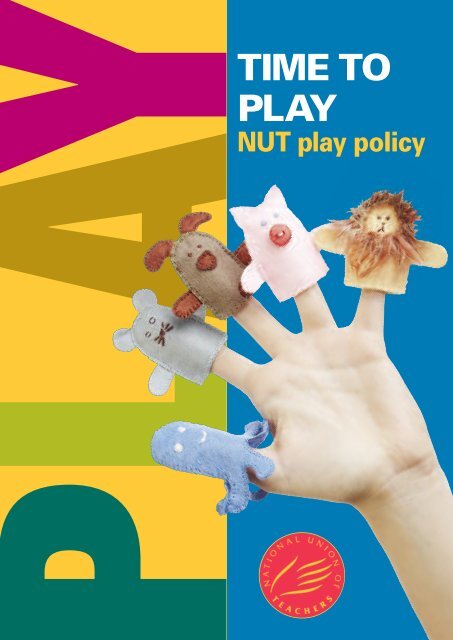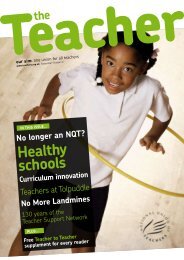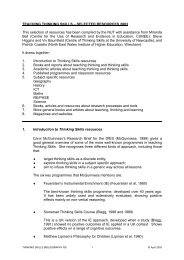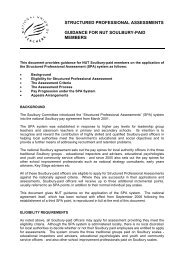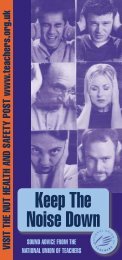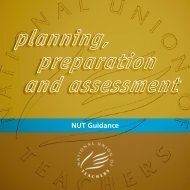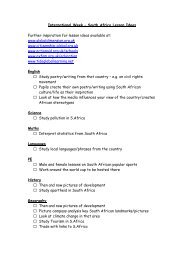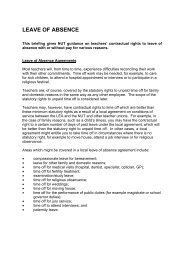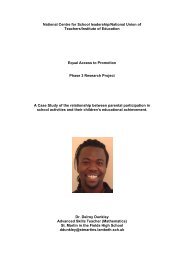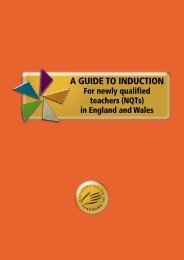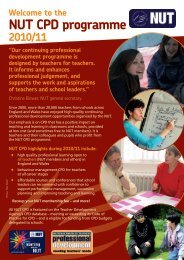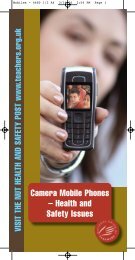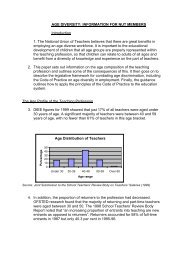NUT play policy - National Union of Teachers
NUT play policy - National Union of Teachers
NUT play policy - National Union of Teachers
You also want an ePaper? Increase the reach of your titles
YUMPU automatically turns print PDFs into web optimized ePapers that Google loves.
LAY<br />
TIME TO<br />
PLAY<br />
<strong>NUT</strong> <strong>play</strong> <strong>policy</strong>
GENERAL SECRETARY’S MESSAGE<br />
The importance <strong>of</strong> <strong>play</strong> in the Foundation Stage is embedded in<br />
its curriculum guidance. From the beginning <strong>of</strong> Year 1 (and<br />
sometimes from Reception), however, the emphasis on formal<br />
learning and assessment is squeezing <strong>play</strong>-based learning out <strong>of</strong><br />
the curriculum, despite the fact that children are still in their early<br />
years <strong>of</strong> development. As children get older, over-formalised<br />
approaches to teaching and learning lead many, particularly boys,<br />
to become disaffected, jeopardising not only their own future life<br />
chances, but those <strong>of</strong> their classmates.<br />
This document has been published in response to <strong>NUT</strong><br />
members’ concerns about this issue. At its Annual Conference in<br />
April 2006, the <strong>NUT</strong> debated the importance <strong>of</strong> <strong>play</strong> in teaching and learning for the first<br />
time, a debate which was not only full <strong>of</strong> personal experiences <strong>of</strong> the benefits <strong>of</strong> <strong>play</strong> for<br />
individual pupils and schools, but in which many speakers also made reference to current<br />
research evidence to support their arguments.<br />
The level <strong>of</strong> debate on a purely educational matter, and the passion with which each speaker<br />
addressed the conference, were impressive and produced an excellent demonstration, if one<br />
was needed, <strong>of</strong> the <strong>NUT</strong>’s commitment to developing policies and practices which have the<br />
potential to benefit the education system as a whole.<br />
This document, therefore, builds on the Annual Conference debate and the contributions<br />
which members have made subsequently to provide a <strong>policy</strong> statement on the role <strong>of</strong> <strong>play</strong> in<br />
teaching and learning and to outline the rationale for this. In addition, the accompanying<br />
resource pack provides a wide range <strong>of</strong> practical suggestions for implementing <strong>play</strong>-based<br />
approaches, reflecting an important strand <strong>of</strong> the <strong>NUT</strong>’s own pr<strong>of</strong>essional development<br />
programme. Indeed, a number <strong>of</strong> those involved in the <strong>NUT</strong> CPD programme, both tutors<br />
and participants, have contributed to this document, which has benefited considerably from<br />
their input.<br />
Recent developments in Wales and Scotland have shown that the time is right for a<br />
fundamental review <strong>of</strong> <strong>National</strong> Curriculum and assessment arrangements and that <strong>play</strong>based<br />
approaches to teaching and learning should form an essential part <strong>of</strong> that review.<br />
I believe that this document has an important contribution to make to the future<br />
development <strong>of</strong> the curriculum in England and, as such, I commend it to you.<br />
Steve Sinnott<br />
General Secretary
The <strong>NUT</strong> believes that, in order to put enjoyment and fun at the centre<br />
<strong>of</strong> learning, the following conditions are needed:<br />
● There should be an independent review <strong>of</strong> the <strong>National</strong> Curriculum and its<br />
assessment arrangements. The review should consider explicitly opportunities for<br />
<strong>play</strong>. It should focus on giving teachers more freedom to introduce <strong>play</strong>-based<br />
activities into their lessons.<br />
● An audit <strong>of</strong> facilities for <strong>play</strong> in schools should be undertaken nationally. The findings<br />
<strong>of</strong> such an audit should be used to inform developments arising from the Building<br />
Schools for the Future initiative, to ensure that all schools have sufficient space to<br />
develop <strong>play</strong> areas within the classroom, the school and the school grounds.<br />
● Informal <strong>play</strong> opportunities for children and young people at break and lunchtime<br />
should be enhanced.<br />
● Local authorities should be encouraged to develop <strong>play</strong> policies in partnership with<br />
schools and young people to establish a strategic and practical framework for <strong>play</strong><br />
provision throughout local children’s services. Local authority support should include<br />
the provision <strong>of</strong> advisers and the channelling <strong>of</strong> resources directly to schools in order<br />
to develop <strong>play</strong> provision.<br />
● Government should fund an initiative to encourage imaginative <strong>play</strong> in all phases <strong>of</strong><br />
education, including the purchase <strong>of</strong> appropriate indoor and outdoor equipment.<br />
3
CONTENTS<br />
GENERAL SECRETARY’S MESSAGE<br />
Page<br />
IFC<br />
FOREWORD: IN SUPPORT OF LIFELONG PLAYING<br />
Dr Elizabeth Wood 5<br />
INTRODUCTION: MAKING THE CASE FOR PLAY 6<br />
<strong>NUT</strong> Policy Statement 7<br />
Why is Play Important? 7<br />
Every Child Matters 8<br />
School Self-Evaluation 10<br />
Wales and Scotland 11<br />
ANNEX A:<br />
LOCAL AUTHORITY PLAY POLICIES 13<br />
The <strong>NUT</strong> wishes to thank Tina Bruce for the use <strong>of</strong> the title Time to Play, which is also the<br />
title <strong>of</strong> her book.<br />
4
FOREWORD<br />
IN SUPPORT OF LIFELONG PLAYING<br />
As a very <strong>play</strong>ful person, and a persistent advocate <strong>of</strong> <strong>play</strong>, it is a great pleasure to have been<br />
involved with the development <strong>of</strong> this <strong>policy</strong>, and to write this foreword. In the context <strong>of</strong><br />
rapid technological and social change, <strong>play</strong> remains an enduring and powerful characteristic<br />
<strong>of</strong> human activity, with new and traditional forms <strong>of</strong> <strong>play</strong> coexisting in different contexts. The<br />
huge explosion <strong>of</strong> computer-based <strong>play</strong> and gaming has enhanced our ludic capabilities, for<br />
example through the development <strong>of</strong> virtual and alternative reality communities that enable<br />
<strong>play</strong>ers to engage with new concepts, ideas and experiences. In the 21st century, education<br />
needs to be much more closely aligned with the ludic activities and capabilities <strong>of</strong> young<br />
people, not least because <strong>play</strong> and <strong>play</strong>fulness support social and interactive skills, as well as<br />
creativity, flexibility and imagination, all <strong>of</strong> which are essential to successful learning and<br />
participation.<br />
We are all aware <strong>of</strong> the importance <strong>of</strong> <strong>play</strong> in early childhood, and the many ways in which<br />
different forms <strong>of</strong> <strong>play</strong> support young children’s learning and development. The <strong>NUT</strong> has<br />
taken this validation further by promoting <strong>play</strong> and <strong>play</strong>fulness across all phases <strong>of</strong><br />
education, and recognising that lifelong <strong>play</strong>ing is just as important as lifelong learning. The<br />
<strong>NUT</strong> <strong>play</strong> <strong>policy</strong> also demonstrates how <strong>play</strong> is closely aligned with personalised learning and<br />
well-being.<br />
Play and <strong>play</strong>fulness should not be seen as a ‘bolt-on’ extra, or another Big Idea that bursts<br />
and fades. By setting out some <strong>of</strong> the key ideas from research, and providing links with key<br />
organisations, this <strong>policy</strong> represents an opportunity to develop sustainable <strong>play</strong> provision and<br />
build ludic capability in educational communities. The examples from practice provide<br />
guidance and inspiration, and demonstrate what can be achieved, sometimes initially<br />
through small changes, and sometimes through more radical transformations.<br />
The <strong>NUT</strong> has consistently advocated flexible, creative approaches to education, based on<br />
pr<strong>of</strong>essional knowledge and decision-making. This <strong>policy</strong> supports these aspirations, and<br />
encourages <strong>play</strong>ful approaches to change.<br />
Dr Elizabeth Wood<br />
Reader in Early Childhood Education<br />
University <strong>of</strong> Exeter<br />
School <strong>of</strong> Education and Lifelong Learning<br />
5
INTRODUCTION<br />
MAKING THE CASE FOR PLAY<br />
This document will not attempt to define ‘<strong>play</strong>’. The Shorter Oxford English Dictionary<br />
contains no fewer than 33 different definitions <strong>of</strong> the word.<br />
As Elizabeth Wood, Reader in Early Childhood Education at the University <strong>of</strong> Exeter has<br />
written 1 , ‘Play cannot easily be defined or categorised because it is always context<br />
dependent, and the contexts are varied. There are many different forms <strong>of</strong> <strong>play</strong> including role<br />
<strong>play</strong>, imaginative <strong>play</strong>, socio-dramatic <strong>play</strong>, heuristic <strong>play</strong>, constructive <strong>play</strong>, fantasy <strong>play</strong>, free<br />
flow <strong>play</strong>, structured <strong>play</strong>, rough and tumble <strong>play</strong>, all <strong>of</strong> which involve a wide range <strong>of</strong><br />
activities and behaviours and result in varied learning and developmental outcomes.’<br />
The <strong>NUT</strong>’s <strong>policy</strong> document therefore does not address all <strong>of</strong> the possible connotations <strong>of</strong><br />
<strong>play</strong> and focuses only on <strong>play</strong> as a potential medium for teaching and learning and an<br />
understanding <strong>of</strong> children’s overall development, through approaches to pedagogy and the<br />
use <strong>of</strong> a full range <strong>of</strong> <strong>play</strong> activities to implement a broad, balanced and relevant educational<br />
experience for children and young people. It is accompanied by a separate resource book <strong>of</strong><br />
information and guidance on <strong>play</strong> which can be used by all teachers and support staff.<br />
The aim <strong>of</strong> this document is to provide a stimulus for thinking about <strong>play</strong> and what it might<br />
mean for individual schools, teachers and children. The document focuses on <strong>play</strong>-based<br />
learning as an important contribution to children’s and young people’s development in the<br />
widest sense, as well as to their academic performance.<br />
The resource book Putting Play into Practice contains case studies and practical ways in<br />
which schools and teachers could consider implementing or consolidating <strong>play</strong>-based<br />
approaches to teaching and learning. The case studies acknowledge the demands on<br />
teachers’ time and the difficulties they have in maintaining balance in the curriculum<br />
currently, so that only those which illustrate clearly the value <strong>of</strong> <strong>play</strong> and which can be<br />
incorporated easily into activities which contribute to young people’s and children’s learning<br />
have been selected.<br />
It is hoped that teachers working with children and young people <strong>of</strong> all ages will find both<br />
documents interesting and use the examples provided as a starting point from which to<br />
develop their own ideas.<br />
Annex A addresses local authority level issues, including the case for developing strategic<br />
plans for <strong>play</strong>, drawing on the example provided by the Welsh Assembly Government<br />
(WAG). It is hoped that the <strong>NUT</strong> head teacher members and <strong>NUT</strong> members working in<br />
advisory posts will find this section <strong>of</strong> particular interest.<br />
It would be very easy to extol the benefits <strong>of</strong> <strong>play</strong> and ignore the context in which schools<br />
and teachers have to operate. The <strong>National</strong> Curriculum and its statutory assessment system,<br />
OFSTED inspection and the accountability regime, target setting, school improvement and<br />
action plans all exert a significant influence on what teachers do in the classroom. In such a<br />
context, <strong>play</strong> is <strong>of</strong>ten viewed negatively by <strong>policy</strong> makers and parents. Increasingly, this has<br />
led to teachers’ concerns about how to justify and explain its inclusion, if not to question<br />
how worthwhile <strong>play</strong> actually is, its value and purpose. It is intended that this document will<br />
support teachers’ inclusion <strong>of</strong> <strong>play</strong> as a valid part <strong>of</strong> their teaching repertoire.<br />
1<br />
Wood, E. and Attfield, J., Play, Learning and the Early Childhood Curriculum, Paul Chapman, 2005<br />
6
The trend towards shortening or removing breaktimes in order to have more ‘teaching’ time;<br />
the designation <strong>of</strong> significant sections <strong>of</strong> the school year as test practice and preparation<br />
time; and the reduction or removal <strong>of</strong> <strong>play</strong> and other child-choice activities from the daily<br />
schedule, even in the Foundation Stage, are all responses to the demands on schools and<br />
teachers to improve test performance. The overriding definition <strong>of</strong> standards-based pupil<br />
outcomes is so narrowly prescribed currently that it can be difficult to see the learning<br />
outcomes that <strong>play</strong> facilitates.<br />
After reading this document, the <strong>NUT</strong> hopes that you will agree with its view that the<br />
question is not whether <strong>play</strong> can foster and enhance children’s learning, but rather why<br />
<strong>play</strong>’s importance to learning is so <strong>of</strong>ten overlooked.<br />
<strong>NUT</strong> POLICY STATEMENT<br />
The <strong>NUT</strong> believes that <strong>play</strong> is an essential part <strong>of</strong> growing up. It has a crucial role in<br />
children’s development, including building their social and emotional confidence. Through<br />
<strong>play</strong>, children learn more about themselves, their relationships with others and the wider<br />
world. Play also helps to consolidate what has been learnt in the classroom. Play helps<br />
children and young people to develop effective risk management and good motor skills.<br />
It is not just young children who learn through <strong>play</strong>: <strong>play</strong> has a crucial role for all, children and<br />
adults alike.<br />
All schools should support and facilitate children’s and young people’s <strong>play</strong>. Play and learning<br />
are not separate; <strong>play</strong> is part <strong>of</strong> learning and learning is part <strong>of</strong> <strong>play</strong>. Learning through <strong>play</strong><br />
supports and enriches learning throughout formal education.<br />
Play in the school context means that children and young people should be given sufficient<br />
freedom and space regularly within the school day to use their imagination to explore both<br />
old and new concepts and develop their confidence in a safe environment.<br />
Such opportunities should be included routinely within the school timetable to enable pupils<br />
to access the curriculum through <strong>play</strong>-based approaches. <strong>Teachers</strong> should be empowered<br />
and have access to appropriate pr<strong>of</strong>essional development to enable them to plan for <strong>play</strong><br />
opportunities relating to the curriculum in the Early Years Foundation Stage and at all key<br />
stages, as well as through any out-<strong>of</strong>-school activities the school may <strong>of</strong>fer.<br />
A ‘<strong>play</strong> is not just for <strong>play</strong>time’ approach should become embedded within schools’ ethos, to<br />
enable all pupils and adults within the school environment to explore learning via <strong>play</strong>-based<br />
experiences.<br />
WHY IS PLAY IMPORTANT?<br />
Play has been recognised as a fundamental human right. The right to <strong>play</strong> is enshrined for all<br />
children and young people up to 18 years old in Article 31 <strong>of</strong> the United Nations Convention<br />
on the Rights <strong>of</strong> the Child:<br />
‘1. States Parties recognise the right <strong>of</strong> the child to rest and leisure, to engage in<br />
<strong>play</strong> and recreational activities appropriate to the age <strong>of</strong> the child and to<br />
participate freely in cultural life and the arts.<br />
2. States Parties shall respect and promote the right <strong>of</strong> the child to participate<br />
fully in cultural and artistic life and shall encourage the provision <strong>of</strong> appropriate<br />
and equal opportunities for cultural, artistic, recreational and leisure activity.’<br />
7
The value <strong>of</strong> <strong>play</strong> is wide ranging, with significance far beyond the simple exercise <strong>of</strong> motor<br />
skills. Play has developmental impact in terms <strong>of</strong> intellect and socialisation, is at the heart <strong>of</strong><br />
individual personality and sense <strong>of</strong> self, and drives the creative process and the growth <strong>of</strong><br />
problem solving skills. It helps us to attain, maintain and retain emotional equilibrium and<br />
facilitates the development <strong>of</strong> skills that enable us to interpret the meaning <strong>of</strong> other people’s<br />
actions.<br />
Recent work on brain studies has added greatly to our understanding and appreciation <strong>of</strong><br />
<strong>play</strong> as a medium for learning. The work <strong>of</strong> Pr<strong>of</strong>essors Susan Greenfield 2 <strong>of</strong> the University <strong>of</strong><br />
Oxford and Howard Gardner 3 <strong>of</strong> the University <strong>of</strong> Harvard, for example, indicates that<br />
learning happens through the connections made within the brain as a result <strong>of</strong> external<br />
stimuli received through the senses. The emotions are as fundamental to the functioning <strong>of</strong><br />
the brain as ‘logical’ thought, so we need to feel good about ourselves in order to learn.<br />
Since <strong>play</strong> is a low-risk, inherently enjoyable activity, the associated emotional encoding will<br />
tend to be positive. There is also a clear link between <strong>play</strong> and well-being. This is well<br />
supported by brain research 4 which shows that <strong>play</strong> prompts the areas <strong>of</strong> the brain<br />
responsible for feeling good about yourself and others into action and sends appropriate<br />
chemical signals that boost self-confidence and good social skills.<br />
EVERY CHILD MATTERS<br />
The five Every Child Matters (ECM) outcomes, with their emphasis on the ‘whole child’,<br />
provide a useful framework to review the wide range <strong>of</strong> research evidence which shows the<br />
variety <strong>of</strong> benefits that <strong>play</strong> can bring.<br />
Being healthy<br />
Play <strong>of</strong>ten involves energetic physical activity, which is known to release oxygen to the brain,<br />
helping to create good physical and mental health and a general sense <strong>of</strong> well-being. There is<br />
plenty <strong>of</strong> evidence <strong>of</strong> the biological and physiological benefits <strong>of</strong> active <strong>play</strong>, the most<br />
obvious being the development <strong>of</strong> motor skills. 5<br />
Play encourages the development <strong>of</strong> flexibility through the opportunity to try out behaviours<br />
or information about the world, which would otherwise not be tried. Research has<br />
suggested that this may also perform the function <strong>of</strong> enabling the brain to retain ‘plasticity’,<br />
which is important in <strong>of</strong>fsetting dementia in old age. 6<br />
Staying safe<br />
Children need and want to take risks when they <strong>play</strong>. Risk taking is essential to children’s<br />
and young people’s development and enables them to learn how to judge the world.<br />
Play provides the freedom to act independently and to experiment without fear <strong>of</strong> the<br />
stressful consequences <strong>of</strong> failure. It also encourages self-initiation <strong>of</strong> activities. It is an<br />
important strategy in allowing children opportunities to exercise control over their world. 7<br />
2<br />
Greenfield, S., The Human Brain: A Guided Tour, Phoenix, 2004<br />
3<br />
Gardner, H., The Disciplined Mind, Prentice Hall, 1999<br />
4<br />
Sunderland, M., The Science <strong>of</strong> Parenting, Dorling Kindersley , 2006.<br />
5<br />
Gallahue, D., Understanding Motor Development, Benchmark Press, 1989<br />
6<br />
Sutton-Smith, B., The Ambiguity <strong>of</strong> Play, Harvard University Press, 1997<br />
7<br />
Bruce, T., Time to Play in Early Childhood Education, Hodder and Stoughton, 1989<br />
8
Enjoying and achieving<br />
The significance <strong>of</strong> <strong>play</strong> in cognitive development, in terms <strong>of</strong> the acquisition <strong>of</strong> information<br />
and knowledge, was first identified by Plato and Aristotle: ‘Enforced learning will not stay in<br />
the mind, so avoid compulsion and let your children <strong>play</strong>’ (Plato). There are numerous<br />
examples <strong>of</strong> educationalists recognising the importance <strong>of</strong> <strong>play</strong> in the learning process, from<br />
Froebel to Steiner to A.S. Neill.<br />
Play nurtures the development <strong>of</strong> creativity and problem solving. When <strong>play</strong>ing make-believe<br />
games and using objects to represent other things, meaning gradually becomes separated<br />
from reality and the capacity for abstract thought begins to develop. Play may become<br />
increasingly complex with age, as it <strong>of</strong>fers opportunities to explore alternative solutions and<br />
combinations <strong>of</strong> behaviour, leading to the development <strong>of</strong> creative problem solving. It has<br />
been suggested that <strong>play</strong> is the only situation where humans are free to be creative. 8<br />
Fantasy <strong>play</strong> involving characters and events encourages representational thinking and<br />
symbolic actions. Socio-dramatic <strong>play</strong>, supported by literacy-rich environments, can foster<br />
confidence in literacy, whilst constructive <strong>play</strong> may involve opportunities for mathematical,<br />
scientific and technological learning.<br />
Play provides the means for understanding new connections and relationships between<br />
ideas, experiences, skills and knowledge. It also supports the consolidation <strong>of</strong> learning as it<br />
involves practice, rehearsal, repetition, mastery and extension. Play promotes meta-skills and<br />
competencies in cognition, memory, language, communication and representation. These<br />
are seen as higher order thinking skills that enable children to make connections between<br />
areas <strong>of</strong> learning and experience. 9<br />
Fun and enjoyment through <strong>play</strong> is experienced by adults and children alike. As well as being<br />
important in its own right, this has been linked to physical and mental heath benefits. Fun also<br />
<strong>of</strong>ten encourages us to concentrate and persevere on a task long enough for learning to occur. 10<br />
Making a positive contribution<br />
Play is supportive <strong>of</strong> emotional growth. When children act out painful experiences in their<br />
fantasy <strong>play</strong>, they come to terms with their own feelings and those <strong>of</strong> others. As a result,<br />
they learn to manage their feelings more effectively. If <strong>play</strong> is inhibited, research suggests<br />
that the individual is likely to become neurotic. 11<br />
Play has an ego-building function, which leads to the development <strong>of</strong> physical and social<br />
skills that enhance self-esteem. This in turn encourages children to discover and explore<br />
their social world, including their cultural and social roles. 12<br />
Play promotes social interaction and socialisation. As well as knowledge, understanding and<br />
processing skills, children acquire an understanding <strong>of</strong> customs, rules and relationships. This<br />
significance <strong>of</strong> <strong>play</strong> was highlighted in a study on abandoned and abused children, which<br />
also suggested that <strong>play</strong> enables us to learn crucial social skills such as sympathy and<br />
empathy. 13 It has been argued that this aspect <strong>of</strong> <strong>play</strong> is not only vital for individual<br />
development but for the evolution <strong>of</strong> the human species, because <strong>play</strong> is the mechanism<br />
that helps us cope with an ever-changing world. 14<br />
8<br />
Winnicot, D., Playing and Reality, Routledge, 1971<br />
9<br />
Wood, E. and Attfield, J., Play, Learning and the Early Childhood Curriculum, Paul Chapman, 2005<br />
10<br />
Ed. Moyles, J., The Excellence <strong>of</strong> Play, Open University Press, 2000<br />
11<br />
Else, P. and Sturrock, G., ‘The Playground as Therapeutic Space: Playwork as Healing’ in Proceedings <strong>of</strong> the IPA/USA Triennial<br />
<strong>National</strong> Conference, June 1998<br />
12<br />
Erikson, E., Childhood and Society, Norton, 1963<br />
13<br />
Brown, F, and Webb, S., ‘Children Without Play’ in Journal <strong>of</strong> Education, March 2005<br />
14<br />
Hughes, B., Evolutionary Playwork and Reflective Analytic Practice, Routledge, 2001<br />
9
Achieving economic well-being<br />
Play encourages children to take responsibility for their own learning. Allowing and positively<br />
promoting children to take control and ownership <strong>of</strong> their own activity is a very important<br />
aspect <strong>of</strong> teaching and learning. It is difficult to become more skilled at problem solving,<br />
investigating or discussing without balance between providing structure or direction and<br />
expecting children to take responsibility for themselves. Children who are used to organising<br />
themselves in <strong>play</strong> and learning activities are more likely to become confident and creative<br />
learners than those who are continually ‘spoon fed’. 15<br />
There is increasing agreement amongst politicians, economists and the business and<br />
academic communities that current approaches to learning are not equipping children and<br />
young people with the skills and dispositions necessary for Great Britain to compete in a<br />
global society. As indicated above, the kinds <strong>of</strong> cognitive and physical abilities identified as<br />
vital for people in the 21st century can, however, be fostered through a <strong>play</strong>-based approach<br />
to learning, for example:<br />
●<br />
●<br />
●<br />
●<br />
●<br />
●<br />
●<br />
●<br />
●<br />
●<br />
making choices and decisions;<br />
negotiation;<br />
independence in thought and action;<br />
intrinsic motivation and persistence;<br />
using imagination and creativity;<br />
experimentation, exploration and investigation <strong>of</strong> ideas and objects;<br />
engagement in hypothetical situations;<br />
use <strong>of</strong> skills and interests already acquired for different purposes;<br />
use <strong>of</strong> a range <strong>of</strong> social and interpersonal skills;<br />
understanding rules and structures; and<br />
● functioning symbolically. 16<br />
This is not to say that core skills such as literacy and numeracy are unimportant, but rather<br />
that the efficacy <strong>of</strong> the teaching and learning <strong>of</strong> these skills would benefit from a more<br />
<strong>play</strong>ful approach.<br />
SCHOOL SELF-EVALUATION<br />
The current OFSTED inspection framework requires schools to seek the views <strong>of</strong> pupils and<br />
to reflect them in its planning and development work. Section 2 <strong>of</strong> the OFSTED Self<br />
Evaluation Form (SEF) requires schools to outline how they gather the views <strong>of</strong> ‘learners,<br />
parents and other stakeholders’, what those views are and how they have been acted upon.<br />
Schools’ self-evaluation activities could, therefore, be used to identify issues concerning<br />
pupils’ enjoyment <strong>of</strong> the educational provision <strong>of</strong>fered and potential improvements to <strong>play</strong><br />
opportunities and resources.<br />
15<br />
Griffiths, R., Mathematics and Play, Open University Press, 2000<br />
16<br />
Moyles, J., The Excellence <strong>of</strong> Play, Open University Press, 2005<br />
10
As Pr<strong>of</strong>essor John MacBeath 17 has said in his report for the <strong>NUT</strong> Schools Speak for<br />
Themselves, consultation with pupils and their involvement with school self-evaluation is the<br />
most effective means <strong>of</strong> finding out about the day-to-day experiences <strong>of</strong> pupils, both in the<br />
classroom and at breaks and lunchtime and about what they value and expect <strong>of</strong> their<br />
school.<br />
Many schools encourage the involvement <strong>of</strong> children and young people in decision-making<br />
processes in schools. They include school councils, circle time, peer working, questionnaires<br />
and consultation events.<br />
Key Stage 2<br />
A primary school in Cardiff involved Key Stage 2 pupils in its school development work<br />
through a ‘pupils as researchers’ project. Pupils reviewed and analysed the existing<br />
outdoor <strong>play</strong> provision and its use, including interviewing other pupils, using video<br />
cameras to monitor levels <strong>of</strong> usage, identifying problem areas, and recording the<br />
activities which took place in the <strong>play</strong>ground.<br />
Using this information, the pupils then devised a strategy for improving the school’s<br />
<strong>play</strong> facilities, which included redesigning the <strong>play</strong>ground, allocating an enclosed area<br />
for ball games, and identifying priorities for purchasing <strong>play</strong> equipment such as board<br />
games, balls, hoops and skipping ropes. Mealtime assistants were involved in helping<br />
the children to learn traditional games and rhymes. As a result <strong>of</strong> the pupils’ work, the<br />
number <strong>of</strong> incidents <strong>of</strong> misbehaviour at break and lunchtimes was reduced significantly<br />
and pupils felt that they had more choices in how to use their time.<br />
WALES AND SCOTLAND<br />
Both Wales and Scotland have recently acted upon the substantial evidence base on the<br />
benefits <strong>of</strong> <strong>play</strong> and have introduced major programmes designed to harness its potential<br />
effect on children’s learning and wider development.<br />
In Wales, a pilot Foundation Phase scheme for three to seven year olds, is due to be rolled<br />
out nationally by 2011. The Foundation Phase 18 is described by the Welsh Assembly<br />
Government as a ‘continuum <strong>of</strong> learning’ which enables children to learn through<br />
‘experimental activities and <strong>play</strong>’. The curriculum framework, which is based on seven areas<br />
<strong>of</strong> learning, is designed to be <strong>play</strong>-based, child-centred and holistic, with less emphasis on<br />
teaching and more on ‘scaffolding’.<br />
The Foundation Phase aims to provide more stimulating educational experiences to boost<br />
children’s attitudes to and independence in learning, as well as their self-esteem. There is<br />
particular emphasis on speaking and listening and on using the outdoors as ‘another<br />
classroom’, where children can become fit and also experience nature.<br />
Evaluations <strong>of</strong> the pilot scheme, which started in 2004, have been extremely positive. Boys<br />
in particular have benefited from the ‘active’ curriculum approach, in many cases exceeding<br />
targets set for them in Reception class.<br />
17<br />
MacBeath, J., Schools Speak for Themselves, <strong>NUT</strong>, 1994.<br />
18<br />
Department for Education, Lifelong Learning and Skills, Building the Foundation Phase Action Plan, DELLS 025-06 WAG, 2006<br />
11
Ysgol y Dderi was selected as the maintained setting to pilot the Foundation Phase<br />
project in Ceredigion. The area community school is located in a rural setting and<br />
serves the educational needs <strong>of</strong> children from neighbouring villages. The bilingual<br />
dimension is fundamental to the educational experiences provided for children and<br />
delivered by the school.<br />
Being involved in the pilot project has enabled us to present our children with skillbased<br />
activities that were tailor-made for their needs and development.<br />
The Early Years staff took the task on board with belief and enthusiasm and were<br />
delighted that at last children could be children and all that was taught would be<br />
meaningful for each individual.<br />
As the fundamental principle <strong>of</strong> the framework is to provide meaningful and exciting<br />
experiences and environment for children we have created a mini village – have<br />
constructed a shop, post <strong>of</strong>fice, garage, park, a greenhouse and garden and a forest<br />
field with adequate shelters. We have also bought suitable clothing, so children feel<br />
comfortable to learn outside.<br />
On reflection, we have found since adopting the concept <strong>of</strong> the Foundation Phase that<br />
the outcome has been that our children are:<br />
● more independent;<br />
● more motivated;<br />
● far more confident;<br />
● more actively involved in their learning processes;<br />
● responding easily to wider whole school initiatives;<br />
● more aware <strong>of</strong> their roles within the local International and multicultural<br />
communities.<br />
<strong>NUT</strong> primary head teacher member<br />
In Scotland, local authorities have been directed to have reviewed, or be reviewing, their<br />
policies on P1 education (five to six year olds) by summer 2007, with a view to introducing<br />
<strong>play</strong>-based teaching techniques throughout the curriculum from August 2007.<br />
12
LOCAL AUTHORITY PLAY POLICIES<br />
ANNEX A<br />
The DfES Green Paper Youth Matters proposes that a duty will be placed on local authorities<br />
to secure ‘positive activities’ for young people. It is right that local authorities <strong>play</strong> a<br />
significant role in developing an empowering role for young people. Whilst local authorities<br />
will have a statutory duty to secure positive activities for young people as both<br />
commissioners and providers, children’s trusts will also have a key role to <strong>play</strong> in providing<br />
targeted support services for young people.<br />
It should be noted that there is very limited investment proposed for these responsibilities,<br />
The Green Paper only refers to new capital funding (£40m over 2006-8) to invest in facilities<br />
for young people. It will therefore be difficult for children’s trusts and local authorities to<br />
develop a more integrated and quality youth service within existing resources as suggested<br />
in the consultation paper.<br />
There is an urgent need to bring together at local level all the present providers <strong>of</strong> <strong>play</strong><br />
provision for children and those whose services impact upon children’s <strong>play</strong> needs, in order<br />
that they might share a common understanding <strong>of</strong> the issues pertaining to children’s <strong>play</strong><br />
and agree a set <strong>of</strong> common principles and a strategic approach. The establishment <strong>of</strong> a local<br />
authority <strong>play</strong> <strong>policy</strong> would facilitate this aim.<br />
Whilst it may not be practicable, nor for that matter desirable, to bring together all <strong>play</strong><br />
provision under a single service, it is imperative that a <strong>policy</strong> which informs a strategic<br />
approach is adopted, through which local authority and private/independent/voluntary sector<br />
planning and delivery can most effectively be determined.<br />
Whilst there is a need to determine what will occur initially by adopting a top-down<br />
approach, it is imperative that the content and internal processes subsequently arise from a<br />
bottom-up approach. This will require the active involvement <strong>of</strong> both children and those<br />
directly involved in the development and delivery <strong>of</strong> <strong>play</strong> provision.<br />
The Welsh Assembly Government has provided guidance on the development <strong>of</strong> local <strong>play</strong><br />
polices 19 which <strong>of</strong>fers a useful example model for England. It believes that a local <strong>play</strong> <strong>policy</strong><br />
should include:<br />
●<br />
●<br />
●<br />
●<br />
●<br />
‘a statement <strong>of</strong> principles and values, informed by the national Government’s <strong>play</strong><br />
<strong>policy</strong>, together with a definition <strong>of</strong> children’s <strong>play</strong> and its importance to children’s<br />
development, well-being and learning;<br />
a statement <strong>of</strong> the vision that partners have for the development <strong>of</strong> provision to meet<br />
children’s <strong>play</strong> needs;<br />
a statement <strong>of</strong> the vision for a future where all children <strong>of</strong> the area covered, and their<br />
<strong>play</strong> needs, are given the highest regard and they are provided with high-quality <strong>play</strong><br />
opportunities;<br />
an agreed definition <strong>of</strong> <strong>play</strong> and a framework <strong>of</strong> values and principles that are<br />
consistent across the geographical area covered;<br />
raise awareness and contribute to a shared understanding <strong>of</strong> the value <strong>of</strong> children’s<br />
<strong>play</strong> and the integral role <strong>of</strong> <strong>play</strong> in all children’s well-being, learning and development;<br />
19<br />
Welsh Assembly Government, Play Policy Guidance for Local Authorities, Partnerships and Voluntary Organisations, WAG, 2005<br />
13
●<br />
promote a new way <strong>of</strong> thinking about and working with children which includes<br />
defining their <strong>play</strong> needs and identifying ways <strong>of</strong> meeting them, providing the basis for<br />
the development <strong>of</strong> a strategy for the allocation <strong>of</strong> resources to deliver both a universal<br />
entitlement to <strong>play</strong> and also strategically in response to identified <strong>play</strong> needs.’<br />
An implementation strategy should also be set out in a local authority <strong>play</strong> <strong>policy</strong>. This should<br />
designate a lead body/agency whose function is to ensure that provision is strategically<br />
planned and coordinated to meet the aims outlined in the <strong>play</strong> <strong>policy</strong>. It should also ensure<br />
that there are clear practical processes to create <strong>play</strong> provision that appropriately reflects the<br />
<strong>play</strong> needs <strong>of</strong> all children and that <strong>play</strong> provision and associated services are both generic<br />
and appropriately targeted, being designed to meet the full range <strong>of</strong> children’s <strong>play</strong> needs.<br />
The WAG Play Policy Implementation Plan sets out a number <strong>of</strong> measures to put its vision<br />
into action, including:<br />
●<br />
●<br />
●<br />
●<br />
●<br />
●<br />
requiring all WAG policies to be examined for their impact on children’s <strong>play</strong> and<br />
national guidance on quality <strong>play</strong>;<br />
WAG guidance on what constitutes quality <strong>play</strong> opportunities;<br />
the development <strong>of</strong> standards for a wide range <strong>of</strong> <strong>play</strong> provision that will be mandatory<br />
for <strong>play</strong> funded by specific grant and advisory for all other provision;<br />
the development <strong>of</strong> training resources on <strong>play</strong> for teaching and non-teaching staff in<br />
schools;<br />
the establishment <strong>of</strong> new standards for <strong>play</strong> provision to ‘define a public benchmark <strong>of</strong><br />
balancing risk against benefit in <strong>play</strong>’; and<br />
the commissioning <strong>of</strong> research on the psychological benefits <strong>of</strong> freely chosen <strong>play</strong>.<br />
The Children’s Play Council has developed four performance indicators for local authorities<br />
on <strong>play</strong> provision. The indicators assess children’s access to <strong>play</strong> provision, quality <strong>of</strong><br />
provision, how much children use provision and <strong>play</strong> outdoors, and children’s satisfaction<br />
with <strong>play</strong> provision. Currently there is no way <strong>of</strong> judging local authority provision on <strong>play</strong> and<br />
funding, for <strong>play</strong> is <strong>of</strong>ten diverted to other areas which are given greater priority.<br />
The Children’s Play Council performance indicators for local authorities would impress on<br />
them the importance <strong>of</strong> the development <strong>of</strong> <strong>play</strong> opportunities for all young people and<br />
provide a useful lever in achieving the <strong>NUT</strong> Annual Conference resolution’s objective <strong>of</strong><br />
establishing local authority <strong>play</strong> policies.<br />
The development <strong>of</strong> local authority <strong>play</strong> policies would also be facilitated by the Every Child<br />
Matters agenda, in particular, the movement towards ‘joined up’ services within local<br />
authorities and the principle <strong>of</strong> ‘achievement and enjoyment’ for young people as one <strong>of</strong> the<br />
five ECM outcomes.<br />
In order for such policies to be effective, clearly designated and ring-fenced funding must be<br />
allocated by local authorities for the provision <strong>of</strong> qualified and skilled <strong>play</strong> advisers to work<br />
with schools and other educational and youth service settings to develop excellent <strong>play</strong><br />
provision for all children and young people.<br />
14
Sources <strong>of</strong> further information<br />
The Children’s Play Council is an alliance <strong>of</strong> national and regional voluntary organisations,<br />
local authorities and partnerships researching and promoting children’s <strong>play</strong>. See<br />
www.ncb.org.uk/cpc for more information.<br />
London Play aims for every child in London to have high quality, accessible and involving <strong>play</strong><br />
opportunities. The organisation supports and coordinates out-<strong>of</strong>-school <strong>play</strong> services across<br />
London and has worked with a number <strong>of</strong> local authorities to develop <strong>play</strong> policies. See<br />
www.london<strong>play</strong>.org.uk for more information.<br />
Playlink supports local authorities to create the best possible <strong>play</strong> opportunities for children<br />
and young people, from <strong>policy</strong> development through to practice. See www.<strong>play</strong>link.org.uk for<br />
more information.<br />
CABE Space (Commission for Architecture and the Built Environment) aims to be a national<br />
champion for urban parks and green spaces. Most <strong>of</strong> its publications can be downloaded<br />
from its website www.cabespace.org.uk<br />
The resource book Putting Play into Practice, which accompanies this document, highlights<br />
some key areas where schools can include <strong>play</strong> in both curricular and extra-curricular<br />
activities. Topics covered by the resource book include:<br />
● Planning for Play in Your School – developing a whole school approach and the role <strong>of</strong><br />
the class teacher<br />
● The Foundation Stage<br />
● The <strong>National</strong> Curriculum<br />
● The <strong>National</strong> Strategies<br />
● Literacy<br />
● Numeracy<br />
● Science<br />
● Physical Education and School Sports<br />
● Creative Partnerships<br />
● Behaviour<br />
● Social and Emotional Aspects <strong>of</strong> Learning (SEAL) Programme<br />
● Boisterous Play<br />
● Therapeutic Play<br />
● Building Schools for the Future and the Primary Capital Programme<br />
● Break and Lunchtime Activities<br />
● Extended Schools<br />
● Healthy Schools<br />
● Inclusion<br />
● Ethnicity<br />
● Gender<br />
● Disability/Special Educational Needs<br />
● Sexual Orientation<br />
● Risk Assessment<br />
● Annex A – Pr<strong>of</strong>essional Development Activities<br />
● Annex B – A Charter for Play<br />
● Acknowledgements<br />
The resource pack is available to download from the <strong>NUT</strong> website www.teachers.org.uk<br />
15
www.teachers.org.uk<br />
OUR AIM: PROFESSIONAL UNITY<br />
<strong>NUT</strong> – The Largest <strong>Teachers</strong>’ Organisation in Europe<br />
Designed and published by The Membership and Communications Department <strong>of</strong> The <strong>National</strong> <strong>Union</strong> <strong>of</strong> <strong>Teachers</strong> – www.teachers.org.uk<br />
Origination by Paragraphics – www.paragraphics.co.uk Printed by Ruskin Press – www.ruskinpress.co.uk – 4925/02/07


